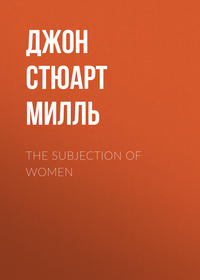 полная версия
полная версияUtilitarianism
Again, Utility is often summarily stigmatized as an immoral doctrine by giving it the name of Expediency, and taking advantage of the popular use of that term to contrast it with Principle. But the Expedient, in the sense in which it is opposed to the Right, generally means that which is expedient for the particular interest of the agent himself: as when a minister sacrifices the interest of his country to keep himself in place. When it means anything better than this, it means that which is expedient for some immediate object, some temporary purpose, but which violates a rule whose observance is expedient in a much higher degree. The Expedient, in this sense, instead of being the same thing with the useful, is a branch of the hurtful. Thus, it would often be expedient, for the purpose of getting over some momentary embarrassment, or attaining some object immediately useful to ourselves or others, to tell a lie. But inasmuch as the cultivation in ourselves of a sensitive feeling on the subject of veracity, is one of the most useful, and the enfeeblement of that feeling one of the most hurtful, things to which our conduct can be instrumental; and inasmuch as any, even unintentional, deviation from truth, does that much towards weakening the trustworthiness of human assertion, which is not only the principal support of all present social well-being, but the insufficiency of which does more than any one thing that can be named to keep back civilisation, virtue, everything on which human happiness on the largest scale depends; we feel that the violation, for a present advantage, of a rule of such transcendent expediency, is not expedient, and that he who, for the sake of a convenience to himself or to some other individual, does what depends on him to deprive mankind of the good, and inflict upon them the evil, involved in the greater or less reliance which they can place in each other's word, acts the part of one of their worst enemies. Yet that even this rule, sacred as it is, admits of possible exceptions, is acknowledged by all moralists; the chief of which is when the withholding of some fact (as of information from a male-factor, or of bad news from a person dangerously ill) would preserve some one (especially a person other than oneself) from great and unmerited evil, and when the withholding can only be effected by denial. But in order that the exception may not extend itself beyond the need, and may have the least possible effect in weakening reliance on veracity, it ought to be recognized, and, if possible, its limits defined; and if the principle of utility is good for anything, it must be good for weighing these conflicting utilities against one another, and marking out the region within which one or the other preponderates.
Again, defenders of utility often find themselves called upon to reply to such objections as this – that there is not time, previous to action, for calculating and weighing the effects of any line of conduct on the general happiness. This is exactly as if any one were to say that it is impossible to guide our conduct by Christianity, because there is not time, on every occasion on which anything has to be done, to read through the Old and New Testaments. The answer to the objection is, that there has been ample time, namely, the whole past duration of the human species. During all that time mankind have been learning by experience the tendencies of actions; on which experience all the prudence, as well as all the morality of life, is dependent. People talk as if the commencement of this course of experience had hitherto been put off, and as if, at the moment when some man feels tempted to meddle with the property or life of another, he had to begin considering for the first time whether murder and theft are injurious to human happiness. Even then I do not think that he would find the question very puzzling; but, at all events, the matter is now done to his hand. It is truly a whimsical supposition, that if mankind were agreed in considering utility to be the test of morality, they would remain without any agreement as to what is useful, and would take no measures for having their notions on the subject taught to the young, and enforced by law and opinion. There is no difficulty in proving any ethical standard whatever to work ill, if we suppose universal idiocy to be conjoined with it, but on any hypothesis short of that, mankind must by this time have acquired positive beliefs as to the effects of some actions on their happiness; and the beliefs which have thus come down are the rules of morality for the multitude, and for the philosopher until he has succeeded in finding better. That philosophers might easily do this, even now, on many subjects; that the received code of ethics is by no means of divine right; and that mankind have still much to learn as to the effects of actions on the general happiness, I admit, or rather, earnestly maintain. The corollaries from the principle of utility, like the precepts of every practical art, admit of indefinite improvement, and, in a progressive state of the human mind, their improvement is perpetually going on. But to consider the rules of morality as improvable, is one thing; to pass over the intermediate generalizations entirely, and endeavour to test each individual action directly by the first principle, is another. It is a strange notion that the acknowledgment of a first principle is inconsistent with the admission of secondary ones. To inform a traveller respecting the place of his ultimate destination, is not to forbid the use of landmarks and direction-posts on the way. The proposition that happiness is the end and aim of morality, does not mean that no road ought to be laid down to that goal, or that persons going thither should not be advised to take one direction rather than another. Men really ought to leave off talking a kind of nonsense on this subject, which they would neither talk nor listen to on other matters of practical concernment. Nobody argues that the art of navigation is not founded on astronomy, because sailors cannot wait to calculate the Nautical Almanack. Being rational creatures, they go to sea with it ready calculated; and all rational creatures go out upon the sea of life with their minds made up on the common questions of right and wrong, as well as on many of the far more difficult questions of wise and foolish. And this, as long as foresight is a human quality, it is to be presumed they will continue to do. Whatever we adopt as the fundamental principle of morality, we require subordinate principles to apply it by: the impossibility of doing without them, being common to all systems, can afford no argument against any one in particular: but gravely to argue as if no such secondary principles could be had, and as if mankind had remained till now, and always must remain, without drawing any general conclusions from the experience of human life, is as high a pitch, I think, as absurdity has ever reached in philosophical controversy.
The remainder of the stock arguments against utilitarianism mostly consist in laying to its charge the common infirmities of human nature, and the general difficulties which embarrass conscientious persons in shaping their course through life. We are told that an utilitarian will be apt to make his own particular case an exception to moral rules, and, when under temptation, will see an utility in the breach of a rule, greater than he will see in its observance. But is utility the only creed which is able to furnish us with excuses for evil doing, and means of cheating our own conscience? They are afforded in abundance by all doctrines which recognise as a fact in morals the existence of conflicting considerations; which all doctrines do, that have been believed by sane persons. It is not the fault of any creed, but of the complicated nature of human affairs, that rules of conduct cannot be so framed as to require no exceptions, and that hardly any kind of action can safely be laid down as either always obligatory or always condemnable. There is no ethical creed which does not temper the rigidity of its laws, by giving a certain latitude, under the moral responsibility of the agent, for accommodation to peculiarities of circumstances; and under every creed, at the opening thus made, self-deception and dishonest casuistry get in. There exists no moral system under which there do not arise unequivocal cases of conflicting obligation. These are the real difficulties, the knotty points both in the theory of ethics, and in the conscientious guidance of personal conduct. They are overcome practically with greater or with less success according to the intellect and virtue of the individual; but it can hardly be pretended that any one will be the less qualified for dealing with them, from possessing an ultimate standard to which conflicting rights and duties can be referred. If utility is the ultimate source of moral obligations, utility may be invoked to decide between them when their demands are incompatible. Though the application of the standard may be difficult, it is better than none at all: while in other systems, the moral laws all claiming independent authority, there is no common umpire entitled to interfere between them; their claims to precedence one over another rest on little better than sophistry, and unless determined, as they generally are, by the unacknowledged influence of considerations of utility, afford a free scope for the action of personal desires and partialities. We must remember that only in these cases of conflict between secondary principles is it requisite that first principles should be appealed to. There is no case of moral obligation in which some secondary principle is not involved; and if only one, there can seldom be any real doubt which one it is, in the mind of any person by whom the principle itself is recognized.
CHAPTER III.
OF THE ULTIMATE SANCTION OF THE PRINCIPLE OF UTILITY
The question is often asked, and properly so, in regard to any supposed moral standard – What is its sanction? what are the motives to obey it? or more specifically, what is the source of its obligation? whence does it derive its binding force? It is a necessary part of moral philosophy to provide the answer to this question; which, though frequently assuming the shape of an objection to the utilitarian morality, as if it had some special applicability to that above others, really arises in regard to all standards. It arises, in fact, whenever a person is called on to adopt a standard or refer morality to any basis on which he has not been accustomed to rest it. For the customary morality, that which education and opinion have consecrated, is the only one which presents itself to the mind with the feeling of being in itself obligatory; and when a person is asked to believe that this morality derives its obligation from some general principle round which custom has not thrown the same halo, the assertion is to him a paradox; the supposed corollaries seem to have a more binding force than the original theorem; the superstructure seems to stand better without, than with, what is represented as its foundation. He says to himself, I feel that I am bound not to rob or murder, betray or deceive; but why am I bound to promote the general happiness? If my own happiness lies in something else, why may I not give that the preference?
If the view adopted by the utilitarian philosophy of the nature of the moral sense be correct, this difficulty will always present itself, until the influences which form moral character have taken the same hold of the principle which they have taken of some of the consequences – until, by the improvement of education, the feeling of unity with our fellow creatures shall be (what it cannot be doubted that Christ intended it to be) as deeply rooted in our character, and to our own consciousness as completely a part of our nature, as the horror of crime is in an ordinarily well-brought-up young person. In the mean time, however, the difficulty has no peculiar application to the doctrine of utility, but is inherent in every attempt to analyse morality and reduce it to principles; which, unless the principle is already in men's minds invested with as much sacredness as any of its applications, always seems to divest them of a part of their sanctity.
The principle of utility either has, or there is no reason why it might not have, all the sanctions which belong to any other system of morals. Those sanctions are either external or internal. Of the external sanctions it is not necessary to speak at any length. They are, the hope of favour and the fear of displeasure from our fellow creatures or from the Ruler of the Universe, along with whatever we may have of sympathy or affection for them or of love and awe of Him, inclining us to do His will independently of selfish consequences. There is evidently no reason why all these motives for observance should not attach themselves to the utilitarian morality, as completely and as powerfully as to any other. Indeed, those of them which refer to our fellow creatures are sure to do so, in proportion to the amount of general intelligence; for whether there be any other ground of moral obligation than the general happiness or not, men do desire happiness; and however imperfect may be their own practice, they desire and commend all conduct in others towards themselves, by which they think their happiness is promoted. With regard to the religious motive, if men believe, as most profess to do, in the goodness of God, those who think that conduciveness to the general happiness is the essence, or even only the criterion, of good, must necessarily believe that it is also that which God approves. The whole force therefore of external reward and punishment, whether physical or moral, and whether proceeding from God or from our fellow men, together with all that the capacities of human nature admit, of disinterested devotion to either, become available to enforce the utilitarian morality, in proportion as that morality is recognized; and the more powerfully, the more the appliances of education and general cultivation are bent to the purpose.
So far as to external sanctions. The internal sanction of duty, whatever our standard of duty may be, is one and the same – a feeling in our own mind; a pain, more or less intense, attendant on violation of duty, which in properly cultivated moral natures rises, in the more serious cases, into shrinking from it as an impossibility. This feeling, when disinterested, and connecting itself with the pure idea of duty, and not with some particular form of it, or with any of the merely accessory circumstances, is the essence of Conscience; though in that complex phenomenon as it actually exists, the simple fact is in general all encrusted over with collateral associations, derived from sympathy, from love, and still more from fear; from all the forms of religious feeling; from the recollections of childhood and of all our past life; from self-esteem, desire of the esteem of others, and occasionally even self-abasement. This extreme complication is, I apprehend, the origin of the sort of mystical character which, by a tendency of the human mind of which there are many other examples, is apt to be attributed to the idea of moral obligation, and which leads people to believe that the idea cannot possibly attach itself to any other objects than those which, by a supposed mysterious law, are found in our present experience to excite it. Its binding force, however, consists in the existence of a mass of feeling which must be broken through in order to do what violates our standard of right, and which, if we do nevertheless violate that standard, will probably have to be encountered afterwards in the form of remorse. Whatever theory we have of the nature or origin of conscience, this is what essentially constitutes it.
The ultimate sanction, therefore, of all morality (external motives apart) being a subjective feeling in our own minds, I see nothing embarrassing to those whose standard is utility, in the question, what is the sanction of that particular standard? We may answer, the same as of all other moral standards – the conscientious feelings of mankind. Undoubtedly this sanction has no binding efficacy on those who do not possess the feelings it appeals to; but neither will these persons be more obedient to any other moral principle than to the utilitarian one. On them morality of any kind has no hold but through the external sanctions. Meanwhile the feelings exist, a feet in human nature, the reality of which, and the great power with which they are capable of acting on those in whom they have been duly cultivated, are proved by experience. No reason has ever been shown why they may not be cultivated to as great intensity in connection with the utilitarian, as with any other rule of morals.
There is, I am aware, a disposition to believe that a person who sees in moral obligation a transcendental fact, an objective reality belonging to the province of "Things in themselves," is likely to be more obedient to it than one who believes it to be entirely subjective, having its seat in human consciousness only. But whatever a person's opinion may be on this point of Ontology, the force he is really urged by is his own subjective feeling, and is exactly measured by its strength. No one's belief that Duty is an objective reality is stronger than the belief that God is so; yet the belief in God, apart from the expectation of actual reward and punishment, only operates on conduct through, and in proportion to, the subjective religious feeling. The sanction, so far as it is disinterested, is always in the mind itself; and the notion, therefore, of the transcendental moralists must be, that this sanction will not exist in the mind unless it is believed to have its root out of the mind; and that if a person is able to say to himself, That which is restraining me, and which is called my conscience, is only a feeling in my own mind, he may possibly draw the conclusion that when the feeling ceases the obligation ceases, and that if he find the feeling inconvenient, he may disregard it, and endeavour to get rid of it. But is this danger confined to the utilitarian morality? Does the belief that moral obligation has its seat outside the mind make the feeling of it too strong to be got rid of? The fact is so far otherwise, that all moralists admit and lament the ease with which, in the generality of minds, conscience can be silenced or stifled. The question, Need I obey my conscience? is quite as often put to themselves by persons who never heard of the principle of utility, as by its adherents. Those whose conscientious feelings are so weak as to allow of their asking this question, if they answer it affirmatively, will not do so because they believe in the transcendental theory, but because of the external sanctions.
It is not necessary, for the present purpose, to decide whether the feeling of duty is innate or implanted. Assuming it to be innate, it is an open question to what objects it naturally attaches itself; for the philosophic supporters of that theory are now agreed that the intuitive perception is of principles of morality, and not of the details. If there be anything innate in the matter, I see no reason why the feeling which is innate should not be that of regard to the pleasures and pains of others. If there is any principle of morals which is intuitively obligatory, I should say it must be that. If so, the intuitive ethics would coincide with the utilitarian, and there would be no further quarrel between them. Even as it is, the intuitive moralists, though they believe that there are other intuitive moral obligations, do already believe this to be one; for they unanimously hold that a large portion of morality turns upon the consideration due to the interests of our fellow creatures. Therefore, if the belief in the transcendental origin of moral obligation gives any additional efficacy to the internal sanction, it appears to me that the utilitarian principle has already the benefit of it.
On the other hand, if, as is my own belief, the moral feelings are not innate, but acquired, they are not for that reason the less natural. It is natural to man to speak, to reason, to build cities, to cultivate the ground, though these are acquired faculties. The moral feelings are not indeed a part of our nature, in the sense of being in any perceptible degree present in all of us; but this, unhappily, is a fact admitted by those who believe the most strenuously in their transcendental origin. Like the other acquired capacities above referred to, the moral faculty, if not a part of our nature, is a natural outgrowth from it; capable, like them, in a certain small degree, of springing up spontaneously; and susceptible of being brought by cultivation to a high degree of development. Unhappily it is also susceptible, by a sufficient use of the external sanctions and of the force of early impressions, of being cultivated in almost any direction: so that there is hardly anything so absurd or so mischievous that it may not, by means of these influences, be made to act on the human mind with all the authority of conscience. To doubt that the same potency might be given by the same means to the principle of utility, even if it had no foundation in human nature, would be flying in the face of all experience.
But moral associations which are wholly of artificial creation, when intellectual culture goes on, yield by degrees to the dissolving force of analysis: and if the feeling of duty, when associated with utility, would appear equally arbitrary; if there were no leading department of our nature, no powerful class of sentiments, with which that association would harmonize, which would make us feel it congenial, and incline us not only to foster it in others (for which we have abundant interested motives), but also to cherish it in ourselves; if there were not, in short, a natural basis of sentiment for utilitarian morality, it might well happen that this association also, even after it had been implanted by education, might be analysed away.
But there is this basis of powerful natural sentiment; and this it is which, when once the general happiness is recognized as the ethical standard, will constitute the strength of the utilitarian morality. This firm foundation is that of the social feelings of mankind; the desire to be in unity with our fellow creatures, which is already a powerful principle in human nature, and happily one of those which tend to become stronger, even without express inculcation, from the influences of advancing civilization. The social state is at once so natural, so necessary, and so habitual to man, that, except in some unusual circumstances or by an effort of voluntary abstraction, he never conceives himself otherwise than as a member of a body; and this association is riveted more and more, as mankind are further removed from the state of savage independence. Any condition, therefore, which is essential to a state of society, becomes more and more an inseparable part of every person's conception of the state of things which he is born into, and which is the destiny of a human being. Now, society between human beings, except in the relation of master and slave, is manifestly impossible on any other footing than that the interests of all are to be consulted. Society between equals can only exist on the understanding that the interests of all are to be regarded equally. And since in all states of civilization, every person, except an absolute monarch, has equals, every one is obliged to live on these terms with somebody; and in every age some advance is made towards a state in which it will be impossible to live permanently on other terms with anybody. In this way people grow up unable to conceive as possible to them a state of total disregard of other people's interests. They are under a necessity of conceiving themselves as at least abstaining from all the grosser injuries, and (if only for their own protection.) living in a state of constant protest against them. They are also familiar with the fact of co-operating with others, and proposing to themselves a collective, not an individual, interest, as the aim (at least for the time being) of their actions. So long as they are co-operating, their ends are identified with those of others; there is at least a temporary feeling that the interests of others are their own interests. Not only does all strengthening of social ties, and all healthy growth of society, give to each individual a stronger personal interest in practically consulting the welfare of others; it also leads him to identify his feelings more and more with their good, or at least with an ever greater degree of practical consideration for it. He comes, as though instinctively, to be conscious of himself as a being who of course pays regard to others. The good of others becomes to him a thing naturally and necessarily to be attended to, like any of the physical conditions of our existence. Now, whatever amount of this feeling a person has, he is urged by the strongest motives both of interest and of sympathy to demonstrate it, and to the utmost of his power encourage it in others; and even if he has none of it himself, he is as greatly interested as any one else that others should have it. Consequently, the smallest germs of the feeling are laid hold of and nourished by the contagion of sympathy and the influences of education; and a complete web of corroborative association is woven round it, by the powerful agency of the external sanctions. This mode of conceiving ourselves and human life, as civilization goes on, is felt to be more and more natural. Every step in political improvement renders it more so, by removing the sources of opposition of interest, and levelling those inequalities of legal privilege between individuals or classes, owing to which there are large portions of mankind whose happiness it is still practicable to disregard. In an improving state of the human mind, the influences are constantly on the increase, which tend to generate in each individual a feeling of unity with all the rest; which feeling, if perfect, would make him never think of, or desire, any beneficial condition for himself, in the benefits of which they are not included. If we now suppose this feeling of unity to be taught as a religion, and the whole force of education, of institutions, and of opinion, directed, as it once was in the case of religion, to make every person grow up from infancy surrounded on all sides both by the profession and by the practice of it, I think that no one, who can realize this conception, will feel any misgiving about the sufficiency of the ultimate sanction for the Happiness morality. To any ethical student who finds the realization difficult, I recommend, as a means of facilitating it, the second of M. Comte's two principal works, the Système de Politique Positive. I entertain the strongest objections to the system of politics and morals set forth in that treatise; but I think it has superabundantly shown the possibility of giving to the service of humanity, even without the aid of belief in a Providence, both the physical power and the social efficacy of a religion; making it take hold of human life, and colour all thought, feeling, and action, in a manner of which the greatest ascendency ever exercised by any religion may be but a type and foretaste; and of which the danger is, not that it should be insufficient, but that it should be so excessive as to interfere unduly with human freedom and individuality.









